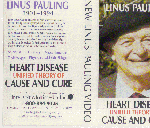The highly-publicized study (2) used as "proof" of a null effect of vitamin E and b-carotene on the incidence of lung cancer in male smokers. In fact, a "statistically- significant" increase in lung cancer incidence was reported in those taking b-carotene (detailed in the Editorial this issue).
The following statement regarding trans-fatty acids on CNN & Company, May 17, 1994:
These trans-fatty acids, found in any kind of vegetable oil which is hardened into margarine or hardened into a vegetable shortening, can raise your good cholesterol and, double whammy, lower your good cholesterol.
The real surprise was that neither the panelists nor the moderator of the other panelists questioned how trans-fatty acids could both raise and lower good cholesterol (aka HDL-cholesterol). The 3 other participants were: Bonnie Leibman of Center for Science in the Public Interest, Elizabeth Whelan of the Am. Council on Science & Health, and Lynn Samuels, a NY radio talk show host.
The affirmation of the safety of an untested product (3). FANSA - the recently-formed Food And Nutrition Science Alliance - is comprised of representatives from ASCN, AIN, IFT, and ADA.
"FANSA's recent release, which strongly supports the safety [emphasis added] and efficacy of bovine somatotropin, is an example of the benefits which can arise from this association."
How could FANSA (or anyone even nominally familiar with science) have reached such a conclusion when no animal (or human) feeding studies have ever been conducted on milk from recombinant bovine growth hormone-treated cows? FANSA's first "accomplishment" was to affirm the safety of an untested product; one can only wonder about FANSA's future proclamations.
Hathcock JN. Safety limits for nutrient intakes: concepts and data requirements. Nutr Rev 51: 278-285, 1993. The Alpha-Tocopherol, Beta-Carotene Cancer Prevention Study Group. Effect of vitamin E and b-carotene on the incidence of lung cancer and other cancers in male smokers. New Engl J Med 330: 1029-1035, 1994. Rivlin RS. President's column. AIN Nutrition Notes 30: 15, 1994. References CitedJON Journal Editorials
 Back to Intelisoft Multimedia, Home Page
Back to Intelisoft Multimedia, Home Page